If you’ve ever bought shrimp and tried to clean them only to find that they smelled like fish, this quick and easy hack can help you get rid of the smell or taste after cooking. This tip has helped me a lot since I first read it in a Chinese cookbook more than twenty years ago. It’s easy and doesn’t take long; I do it every time we have shrimp.
Shrimp is a delicious seafood that can be prepared in endless ways However, sometimes shrimp can have an unpleasant fishy odor or taste that puts people off. As someone who loves shrimp, I’ve experimented with various methods to get rid of that fishy shrimp taste and smell
In this article I’ll share what causes shrimp to taste fishy and walk through techniques you can use to enjoy shrimp without the strong fishy flavor. From easy soaking solutions to cooking tips these tricks will have your shrimp tasting fresher in no time.
What Causes Shrimp to Taste Fishy?
Before diving into solutions, let’s quickly cover what makes shrimp taste overly fishy in the first place:
-
Age – Older shrimp starts to spoil and take on a fishier taste. Always check the freshness.
-
Improper Storage – Storing shrimp at too warm of a temperature or exposing it to air causes fishy compounds to develop.
-
Diet – Shrimp that eat more plankton and smaller sea creatures taste fishier than those eating plant matter.
-
Water Quality – Shrimp from polluted waters will absorb a fishier flavor.
-
Overcooking – Cooking shrimp for too long can make it rubbery and fishy.
-
Oxidation – Exposure to air causes oxidation which produces fishy tasting compounds.
Knowing what makes shrimp fishy gives us clues on how to fix it! Now let’s get into the various methods for removing that unpleasant fishy taste.
Easy Ways to Remove Fishy Taste from Shrimp
Soak in Milk
One of the easiest and most effective ways to remove fishy odor from shrimp is to soak it in milk. The proteins and enzymes in milk work to extract those volatile fishy compounds.
Method:
- Place raw, peeled shrimp in a bowl and cover with milk.
- Refrigerate and soak for 30 minutes up to 2 hours.
- Remove shrimp from milk and rinse under cold water.
- Pat dry with paper towels.
The longer you soak, the more mild the shrimp will taste. For quick removal, 30 minutes does the trick.
Use Acidic Ingredients
Acidic ingredients like lemon juice, lime juice, and vinegar all help to neutralize and mask fishy tastes in shrimp. The acid essentially cooks the proteins in the shrimp, stopping the fishy compounds from being released.
Some easy ways to use acidic ingredients:
- Add lemon/lime juice and zest to shrimp and let sit 15 minutes before cooking.
- Marinate shrimp in a vinaigrette or mixture of oil, vinegar, and spices for 1 hour.
- Mix a tablespoon of vinegar into the poaching liquid when boiling shrimp.
Citrus juices and vinegars work fast to remove fishy shrimp smells. Always add them right before cooking.
Change the Cooking Method
How you cook shrimp also impacts how fishy it tastes. Methods that expose the shrimp to high heat help reduce fishiness:
-
Grilling – The high dry heat caramelizes the shell and meat, giving bold flavor.
-
Sautéeing – Cooking in a little oil releases moisture to reduce fishy compounds.
-
Broiling – High heat from above browns the shell and seals in juices.
Avoid boiling, steaming, and poaching which all retain moisture and fishy tastes. Go for drier, high heat cooking.
Switch Up the Spices and Herbs
Choosing the right supporting ingredients can help cover up fishy notes in shrimp. Here are some good options:
-
Garlic, ginger, onions – Their bold aromas stand up to fishy notes.
-
Spicy chilies, black pepper – Spices distract from any unpleasant flavors.
-
Herbs like oregano, thyme, dill – Fresh or dried herbs add lots of flavor.
-
Spice blends like Cajun, jerk, curry – Robust spice mixes pair perfectly with shrimp.
Use liberally when seasoning shrimp to mask subtle fishy undertones.
Rinse Thoroughly
A simple rinse under cold running water makes a difference. The flowing water washes away fishy compounds from the surface of the shrimp.
Rinse shrimp just before cooking after thawing or marinating. Then pat very dry with paper towels so they cook up light and tender.
Tried and True Methods to Remove Fishy Shrimp Odor
While the above techniques are easy and effective, they sometimes aren’t enough for extremely fishy or spoiled shrimp.
In those cases, try these more intensive methods that use common pantry ingredients:
Baking Soda Soak
Baking soda is alkaline and helps neutralize acids that cause fishy odors in shrimp. The soak times are longer since baking soda is slower acting.
Method:
- In a bowl, mix 4 cups water and 4 Tbsp baking soda until dissolved.
- Add 1 lb shrimp and refrigerate 30 minutes up to 2 hours.
- Remove shrimp, rinse, and pat dry.
Saltwater Brine
Salt helps extract moisture and fishy compounds from shrimp meat. The brine cure gives a sweet, mild flavor.
Method:
- Stir 1/4 cup salt into 4 cups water until dissolved.
- Add shrimp and refrigerate 1 hour.
- Rinse shrimp under cold water and pat very dry.
Vinegar Wash
Vinegar is highly acidic which counteracts basic compounds causing fishy odors in shrimp. It works fast to make shrimp smell fresh.
Method:
- Fill a bowl with 4 cups cold water and 1 cup white vinegar.
- Soak shrimp 10 minutes, stirring occasionally.
- Drain shrimp and rinse very well under running water.
Pro Tips for Preventing Fishy Shrimp
The best way to avoid having to remove fishiness from shrimp is to prevent it in the first place. Here are some helpful tips:
-
Purchase fresh, raw shrimp on ice with clear eyes and minimal odor. Check the sell-by date.
-
Keep shrimp very cold at 32-40°F until ready to use. Thaw in the refrigerator, not on the counter.
-
Rinse thawed shrimp under cold water and pat dry with paper towels before cooking.
-
Avoid overcooking shrimp which makes them tough and fishy.
-
Store cooked shrimp in airtight containers and only refrigerate 1-2 days maximum.
Following proper handling, storage, and cooking helps minimize any fishy flavors from developing.
The Takeaway on Enjoying Shrimp without Fishy Taste
Hopefully this article gave you plenty of techniques to try for banishing fishy tastes from shrimp. With a little trial and error, you’ll find your go-to method for making shrimp taste fresh and delicious.
Here are some key tips to remember:
-
Know what causes the fishy flavor – age, storage, diet, water, cooking. Then you can prevent it.
-
Soaking in milk, acid ingredients, salt, baking soda, or vinegar removes fishy compounds.
-
Cook using high, dry heat like grilling, sautéing or broiling.
-
Add lots of spices, herbs, garlic, ginger and onions to mask any unpleasant flavors.
-
Handle, store, and cook shrimp properly to avoid fishiness in the first place.
Next time you buy shrimp, stay confident that you have plenty of tricks up your sleeve for getting rid of any fishiness. Just use one of these techniques and your shrimp will taste sweet and briny without any unpleasant fishiness.

Hack to cut the Shrimp Smell
- Just add a teaspoon of salt,
- Stir for one minute, and
- Give it a good rinse.
- Repeat 3 times
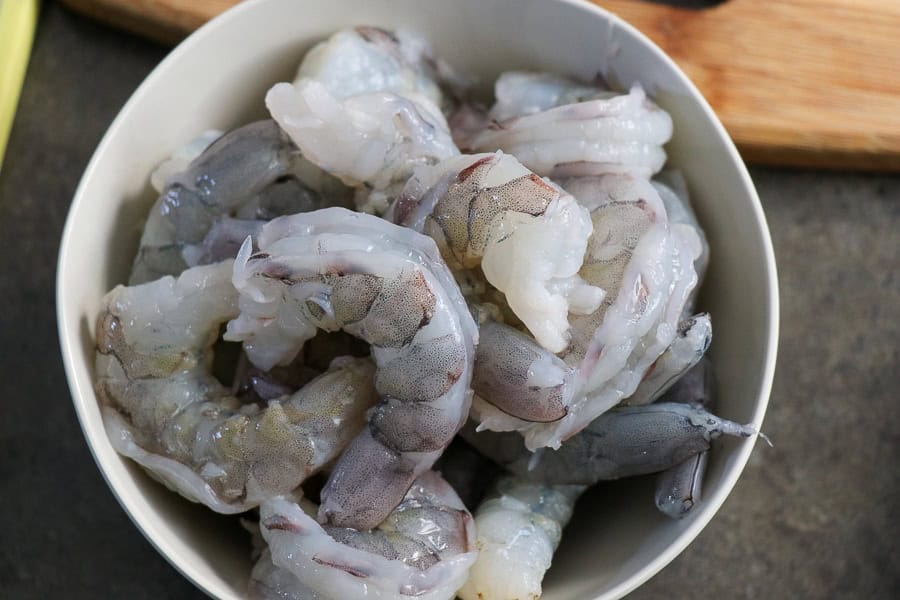
Check out how simple it is to eliminate the shrimp smell!!
- To prepare shrimp, remove the shells and devein them.
- Place the Shrimp in a bowl
- Add one (1) teaspoon of salt to the shrimp
- Stir for one (1) minute
- Rinse the shrimp under cold running water using a colander.
- Put the Shrimp back in the bowl
- Sprinkle one teaspoon of salt over the shrimp.
- Stir the shrimp for one (1) minute.
- Rinse the shrimp again.
- Sprinkle another (1) teaspoon of salt on the Shrimp.
- Stir the shrimp for one (1) minute.
- Put the shrimp in a colander and run cold water over them several times to clean them well.
One useful thing I’ve learned over the years is that shrimp can be cooked without making it taste fishy or salty. This trick to eliminate the shrimp smell can help enhance its flavor and plump it up. Even if the shrimp doesnt have a strong scent, this quick and easy trick always works. Give it a try and see the difference it can make to your dish.
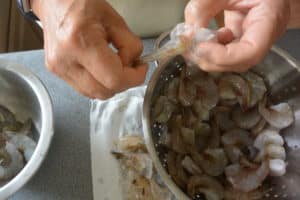
Place the shrimp into a bowl
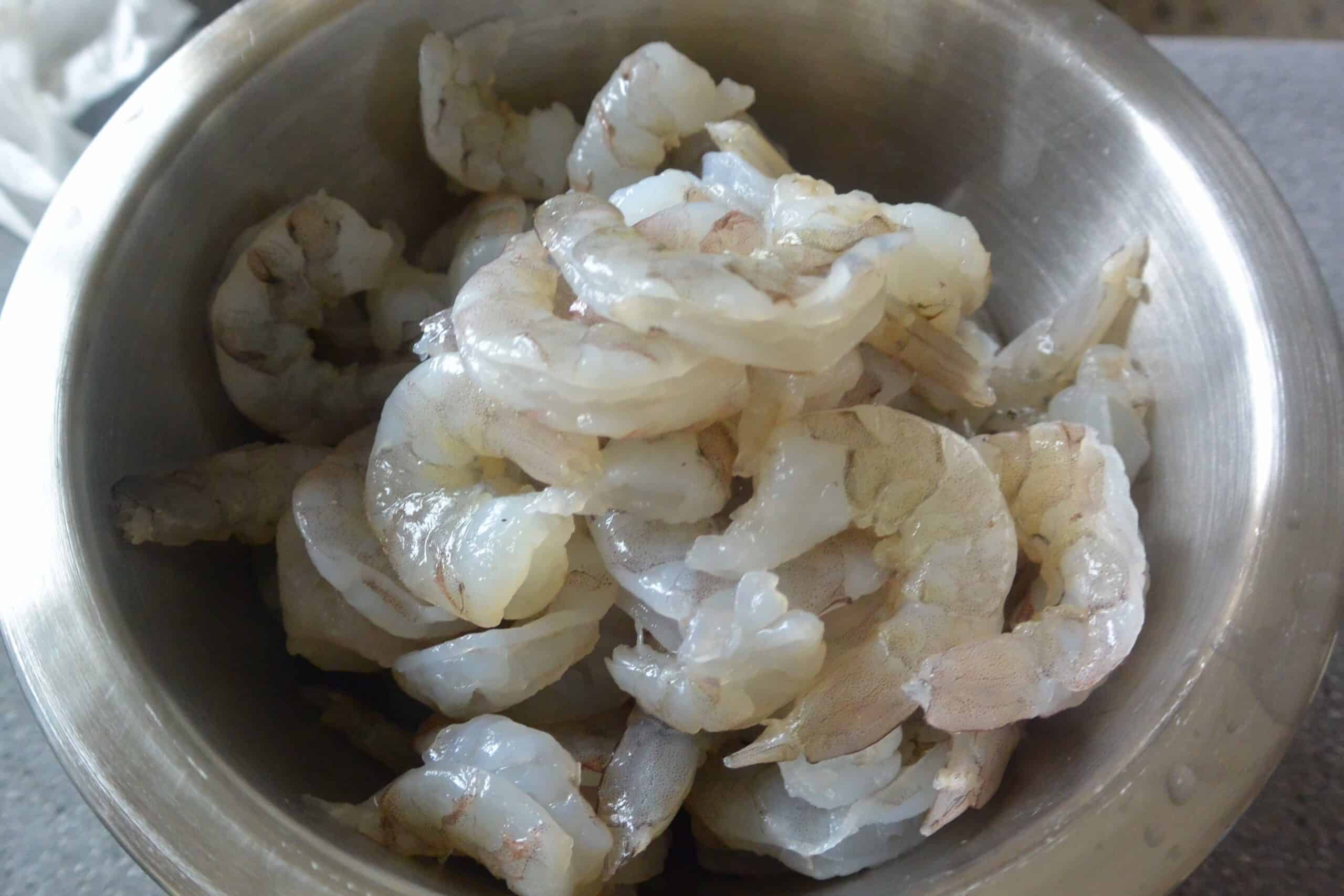
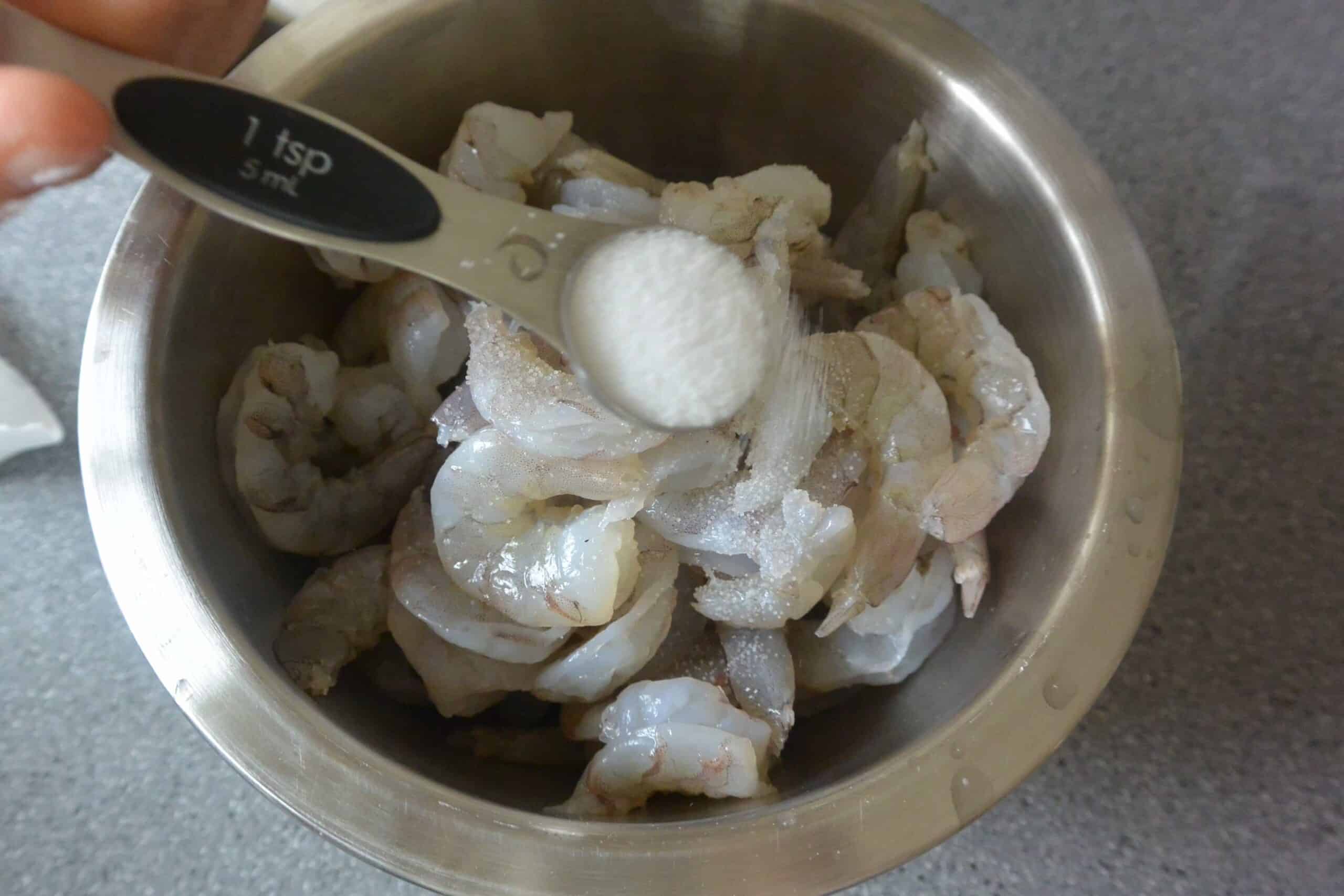
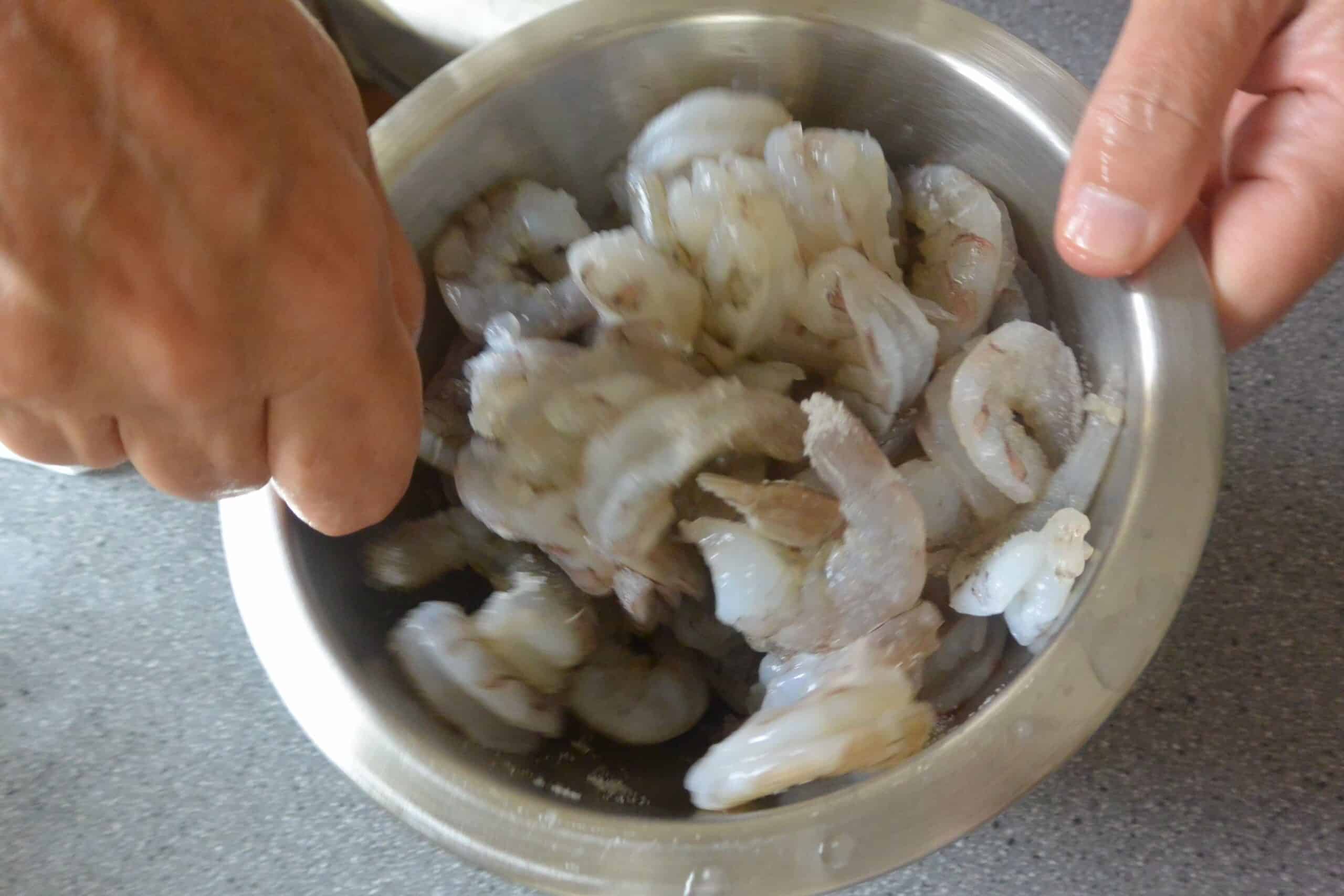
How to clean seafood , how to finish smell of seafood , shrimp prepared for cooking @masha24359
How do you get rid of a fishy taste?
Cooking your seafood with lemon or adding a spritz at the end is an easy way to get rid of that fishy flavor. If you’ve ever cooked fish at home, you’re probably familiar with that unpleasant “fishy” taste seafood sometimes takes on. It can be enough to make anyone want to stop eating it altogether.
How to remove fish smell from fish?
to soak the fish in milk for how long before rinsing. Mix vinegar with fresh water then soak fish in it for 5 minutes; rinse and dry it with paper towel before marinating. This method will be able to reduce 50% fishy smell. You should not cook fish if you want to remove fishy smell 100%.
How do you make fish taste better?
Disguise fishiness: The other angle is to “cover up” the flavour with lots of spicy glaze or garlic/lemon flavours instead. Pick mild seafood: The other thing to try is to pick a more mildly flavoured fish (e.g. a white fish instead of something like tuna or salmon). Avoid oily fish as they tend to have a stronger flavour.
Why does seafood smell and taste fishy?
Unless the fish or seafood you’ve bought is literally the catch of the day, chances are it will smell and taste at least a little fishy, thanks to a compound found in nearly all seafood called trimethylamine oxide, or TMAO.
